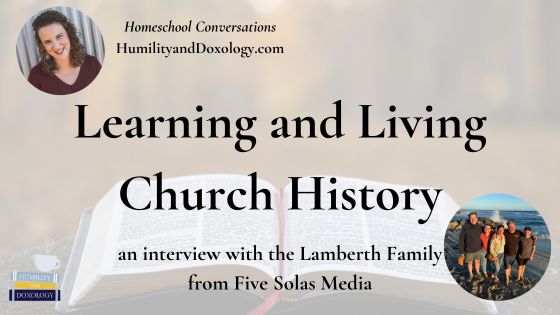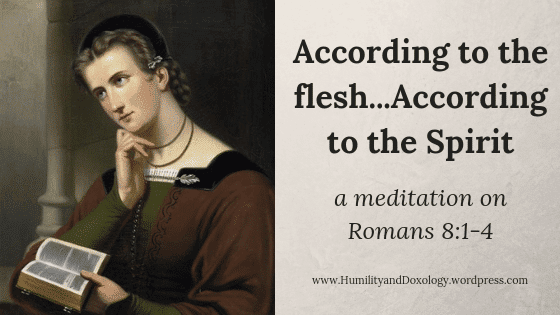When I sat down with the Lamberth family of Five Solas Media, I knew it would be a conversation full of encouragement, creativity, and a contagious love for church history. This homeschool family has turned their passion for history and the gospel into films, podcasts, and resources that are blessing families around the world.
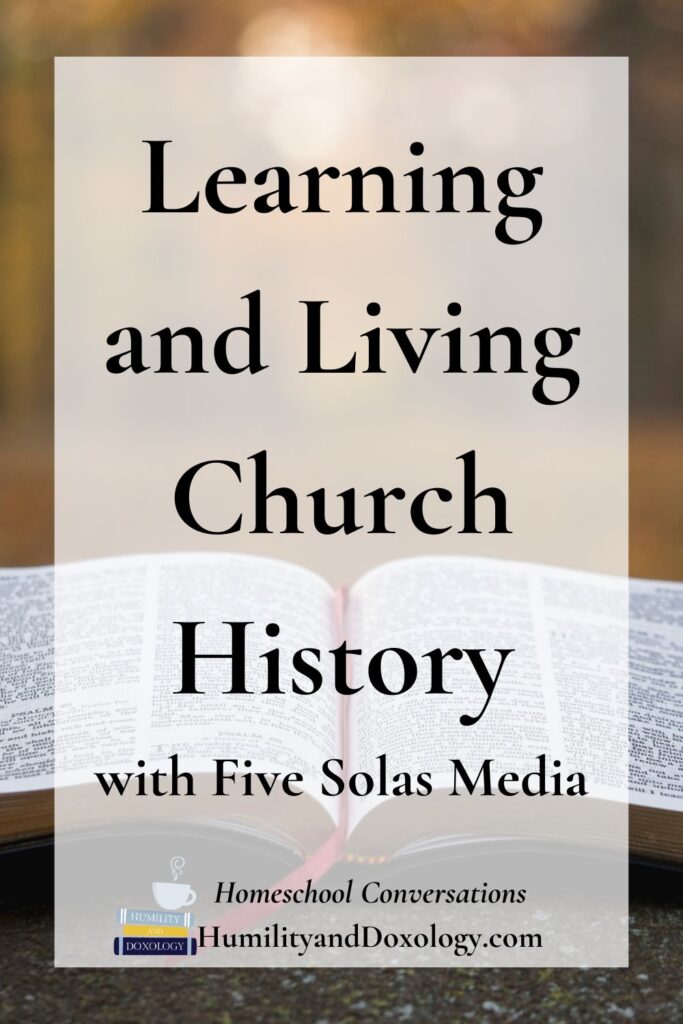
{This post contains paid links. Please see disclaimer.}

Meet the Lamberths: A Family on Mission
Troy and Melissa, along with their children Jackson, Madeline, and Owen, share their homeschool life and ministry. Each child has taken part in the church history projects produced by Five Solas Media.
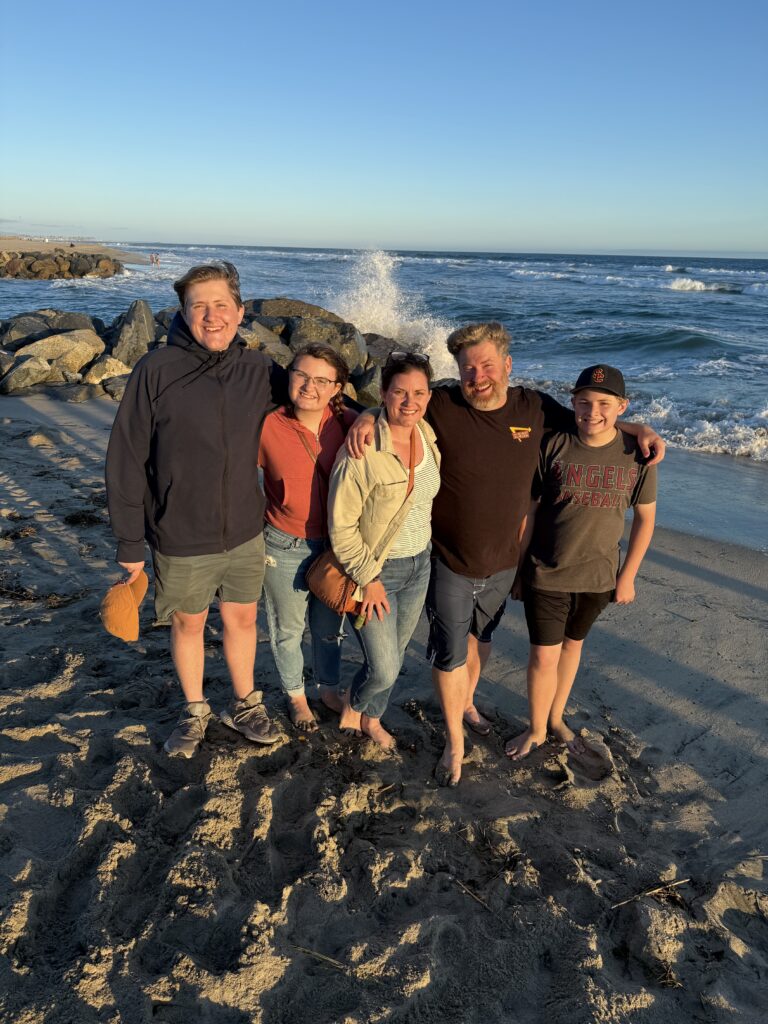
Five Solas Media is a family-run nonprofit that combines creativity, film, and gospel storytelling. Their mission? To remind us that the same gospel hope that sustained believers in the past still sustains us today.
Melissa admitted her own journey with church history began with realizing what she didn’t know: “I realized I didn’t know anything about church history, and that was a problem. So… we decided to start the Reformation Night so that we could share with others.”
Jackson was surprised by how many Christians don’t know church history: “Martin Luther is like a household name… but there are a lot of Christians out there who don’t know church history. That’s where our films can come in and really help people understand it.”
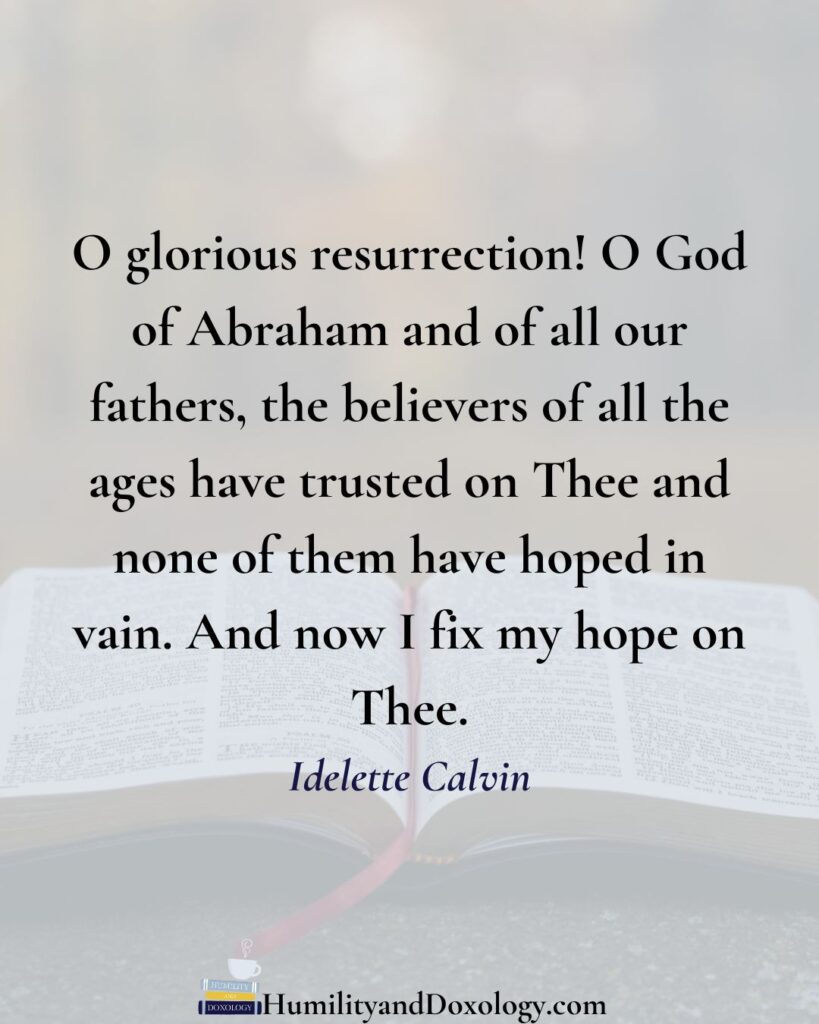
What Are the Five Solas?
Melissa explained clearly: “We believe that scripture says that we are saved by faith alone, through grace alone, in Christ alone, for the glory of God alone.”
Troy added, “At the core, sola scriptura was the cry of the Reformation. We need to go back to what the Bible teaches, not what men and traditions have been teaching.”

The Unique Format: Kids’ Voices, Adult Actors
Five Solas films feature children’s voices dubbed over adult actors. It’s a challenge, but a powerful teaching tool. As Melissa shared: “The kids’ voices get recorded first… and then there’s the challenging part of dubbing those voices over the adult actors.”
Troy reflected, “Sometimes you just come out of sync… so you really have to do a lot of cutting. But it actually turns out pretty good.”
My kids really have enjoyed the videos from Five Solas Media! They’re engaging even for your little ones, but include rich depth for the older members of the family to enjoy as well.
Encouragement to Keep Going
Like any family balancing jobs, homeschooling, and ministry, the Lamberths have faced challenges. Melissa shared honestly: “Every time we felt like, oh, is this something that we even need to be doing? God did send encouragement, whether it was… somebody just randomly leaving a comment or emailing saying this really is important to us.”
Favorite Figures from Church History
The family’s enthusiasm for historical figures was contagious:
- Troy: “One stands out… her name is Perpetua… Christ was more important to her… a great testimony that Jesus is far more valuable than what the world has to offer.”
- Melissa: “I’m going to say Idellette Calvin… through all those trials, through all that sickness, she was never a burden to me.”
- Madeline: “I really like Anne Bradstreet’s story… she lost everything in the fire… but in the end… she was looking to Christ in everything.”
- Jackson: “I really love… Adoniram Judson, Hudson Taylor, John Elliott… their gospel influence… many have come to faith because of them.”
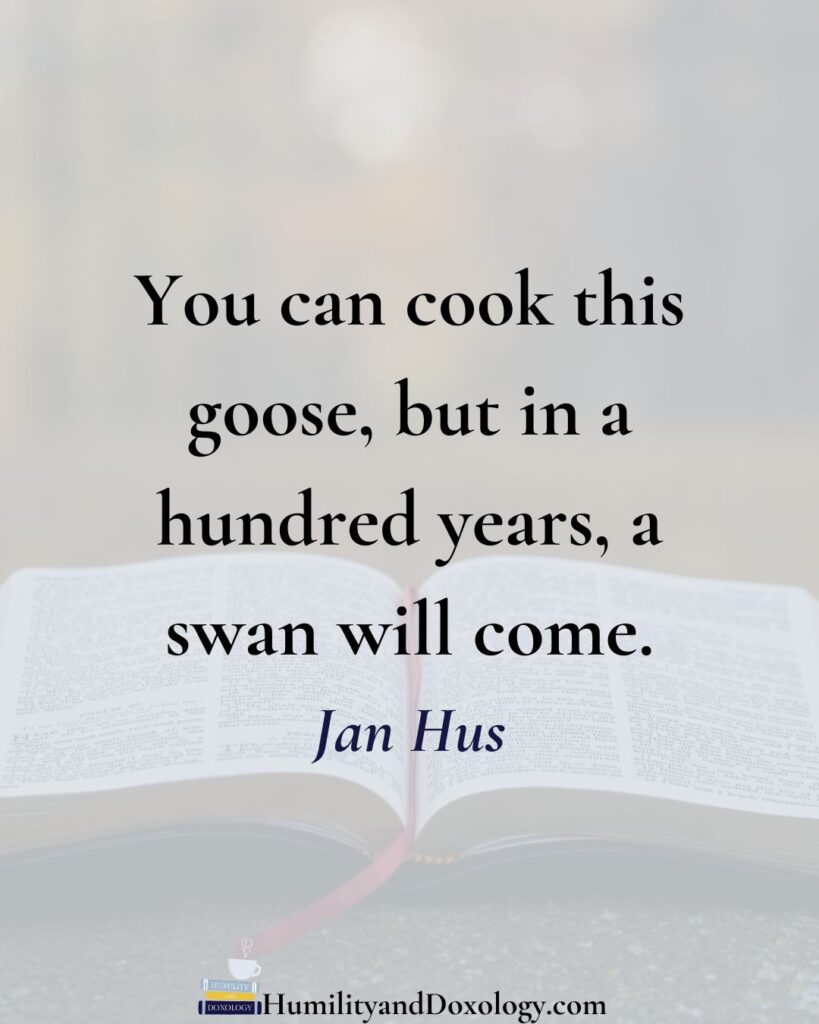
Homeschool Tips and Daily Life
As a homeschool mom, Melissa shared her best advice for bad days: “I would say read aloud… and obviously praying… both of those things will definitely bring you back together and calm your spirits.”
Where to Find Five Solas Media
The Lamberths can be found online at fivesolasmedia.com, on YouTube, and on their podcast All Things Together. What a joy to see how this family uses their creativity to share the extraordinary hope of Christ!
Resources Mentioned:
- Five Solas Media Website
- All Things Together Podcast
- Five Solas Media YouTube
- Five Solas Media Instagram
- Five Solas Media Facebook
- Counsel for Christian Workers by Charles Spurgeon
- Anne Bradstreet podcast episode
You May Also Enjoy:
- Church History for Children (with Simonetta Carr)
- Beginner’s Guide to Church History
- Wisdom, Truth, and Cultural Discernment with Dr. Carl Trueman
- Teaching the Creeds to Our Children
- Memory Work Resource Pack: Ecumenical Creeds
- Ultimate Guide: What Every Child Should Know About the Bible (+ Free Printables)
- Church History (with special guests from the Kids Talk Church History podcast)
Check out all the other interviews in my Homeschool Conversations series!

Amy Sloan: Oh, guys, I am so excited to be joined today by the family behind the Sola, let me say all that again. Hello, friends. Today, I am so excited to be joined by the family behind the 5 Solas Media, which is a family-run nonprofit. Their purpose is to encourage others with how Christians in the past lived with the same gospel hope we have today. And I’ve enjoyed seeing many of your resources online, as have my children, and I’m really excited to chat with you today. So let’s go through and each of you introduce yourselves. We’ll do mom and dad first, and then the offspring, oldest to youngest.
Troy Lamberth: Sure. My name is Troy Lamberth, and this is my wife.
Melissa Lamberth: Melissa Lamberth.
Troy Lamberth: And we just celebrated 20 years of marriage, and we have our three kids here with us.
Amy Sloan: All right.
Jackson Lamberth: I’m Jackson Lamberth, I’m 17, almost 18, and I work at Trader Joe’s, and I’m working on my first album.
Madeline Lamberth: I’m Madeline Lamberth, I’m 15 going on 16, and I’m hoping to start Driver’s Ed soon.
Owen Lamberth: I’m Owen Lamberth, and I’m 14, and I’m working on my first book, hopefully to come.
Amy Sloan: Well, you’ll have to let us know once that book comes out, for sure. Yeah, so I really feel like we needed the 15 going on 16 song, but we’ll save that for next time, I guess. So as a family, you guys teach other families and help support other families learning about church history, but I’m curious if you as a family have always been interested in church history, and what about it you find especially fascinating or important? I was wondering if we could this time go youngest to oldest.
Troy Lamberth: Oh, there we go. All right, Owen.
Amy Sloan: Is there anything in particular about church history that you find important or interesting or weird? I don’t know.
Owen Lamberth: I think part, who was it, John Huss, he was alive, when again?
Melissa Lamberth: Pre-Reformation.
Owen Lamberth: Pre-Reformation, he was the guy, I think he said, I bet I’m paraphrasing, but you can cook this goose, but in a hundred years, a swan will come, and I can’t remember the whole quote, but, and then a hundred years later was Martin Luther, and I just thought that’s something that I think is really interesting, and then Martin Luther, you know, kind of kicked the Reformation into starting.
Amy Sloan: Yeah, that’s awesome. How about you? Madeline, have you always, is it basically like if your parents made you get interested in church history, or is it kind of like, I don’t know, maybe they twisted my arm a little bit but now I find it interesting, too.
Madeline Lamberth: Yeah, I think when we made our first movie, I don’t know if I knew too much about church history, because I was only seven years old, but then once we made the Martin Luther movie and then Katie Luther, I did get into it, and I really enjoy, like, while we’ve worked on all these podcasts and all these movies, getting to learn about these church history heroes a lot more.
Amy Sloan: Yeah, was there a particular favorite project that sort of, you were like, oh, actually now I enjoy it, or was it just a gradual process?
[00:03:48] Madeline Lamberth: I did enjoy making our first movie, but I really enjoyed making our Katie Luther movie, because I think the scenery and everything, it was my favorite one.
Amy Sloan: Yeah, she’s a pretty cool lady, too. How about you, Jackson?
Jackson Lamberth: I feel like church history was always something I was like, we would talk about a lot, especially I grew up, you know, with our Reformation Night that they helped start, and so I, you know, it was always kind of something that was there, but I definitely think it was really cool to dive deeper into it, because, you know, as they were studying and getting, you know, prepared for making different movies and stuff, they were always reading quotes or facts or, you know, stuff from books about people from church history, so you kind of living with them just absorbed that stuff, and I don’t know, it’s been very fascinating to learn about, you know, our brothers and sisters in Christ who have gone before, you know, and faced a lot harder than we have, you know, in this day and age.
Amy Sloan: Yeah, definitely. All right, so, Troy and Melissa, how did this all get started for you guys? Have you guys always been interested in church history, or what is it about it that you think is fascinating or important?
Melissa Lamberth: I think for me, it was actually when my family started to reform before I was married, I realized I didn’t know anything about church history, and that was a problem. So when Troy and I were married just before having kids, like literally as I was nine months pregnant, pretty much, we decided to start the Reformation Night so that we could share with others about at least the Reformation at the church, and that really turned into what is now Five Souls Media and our desire to share with other Christians how other Christians in the past lived and how they dealt with all the trials, which were a lot more trials than we do now, especially in early church history and Reformation and people being put people being put to death for their faith. Just sharing that to encourage others became our mission. So it helped that we were both history buffs.
Troy Lamberth: Yeah, yeah.
Melissa Lamberth: Always been interested in history in general, but when you add faith to that, that’s just, it’s magical, you know?
Troy Lamberth: Yeah.
Melissa Lamberth: It’s a magical combination.
Troy Lamberth: Yeah, absolutely. For me, my dad was a huge history fan, and so I grew up with him reading stories to us about Davy Crockett and the American Revolution, and so when I got to college, I really wanted to make movies. That’s what I wanted to do ever since I was a kid. I was a gingerbread man in my kindergarten play, and that just got bit by the performance acting bug, and I got older and I wanted to direct and make movies, but then there’s the practical side. Okay, I should go to college. What should I major in? I don’t know. I enjoy history. I thought I’d read, I almost chose literature, but I thought I’ll read less in history, and that wasn’t right. I read just as much in there, but it was just about real stories. So as Melissa said, I think she summed it up very well, that we both had this history buff side, and then as Christians, to look at the hand of providence throughout church history and how God has used, really, for the most part, just average people to be faithful in hard times and good times, but it just really kind of lit a fire under us when we started helping tell those stories, particularly out of the Reformation, but now we’ve tried to expand it with our podcast too. Just recently, we did a story about Charles Spurgeon and how he really worked so hard, he needed to take a break. And so we called it Spurgeon Takes a Holiday, and it’s about the importance of finding time to rest, because God didn’t make us to work 24-7. He created a Sabbath, and he created seasons, and there’s a season to rest, and Spurgeon even learned that lesson. So it was fun to kind of tell that story.
Amy Sloan: Yeah, I think it’s so fascinating when we study church history to realize how God just does use these very ordinary people, and a lot of times, very broken people, kind of like the Davids of the world, the people you’re like, I don’t, I really, are you sure that’s who you want to choose? But it’s really encouraging then as we study those stories, we realize God can use us as well, right? Because it’s all based on Christ. So I’d love to hear a little bit from you, Troy and Melissa, how you got started with Five Solas Media, but before you kind of tell that story, let’s start just like somebody who’s like, I don’t even know what you mean by Five Solas. What does Five Solas mean?
Troy Lamberth: Well, if they’re watching the video, they can see my shirt right here. Go ahead, Melissa.
Melissa Lamberth: So the Five Solas, we thought were a way to share the gospel, because people are going to ask, what are the Five Solas? Well, during the Reformation, it was a list of things to help explain what Christianity truly was. So we believe that scripture says that we are saved by faith alone, through grace alone, in Christ alone, for the glory of God alone.
Troy Lamberth: Yeah, and the key part there, so the Five Solas, sola means alone in Latin, and it’s just a simple way of the church in the Reformation period where there was so much tradition and there was so much actually added to the gospel. You need to do this. You need to earn that. Even what sparked the Reformation with Martin Luther was they were offering indulgences where you could pay to get yourself out of purgatory or to get a family member out of purgatory. And the Reformers were like, the Bible doesn’t teach this. And so that at the core, sola scriptura was the cry of the Reformation. We need to go back to what the Bible teaches, not what men and traditions have been teaching. What does the Bible actually say? And as I looked at that, they saw that we are saved not by works, not by any amount of money. I was just preaching last night at our church and mentioned in 1 Peter, Peter says, there is no amount of gold or silver that can earn salvation. It is the precious blood of Jesus. And that’s really at the heart of what the Five Solas is about, is looking to Christ and the free grace that he gives us and that all of our life can be lived to the glory of God in the simple, the mundane, the boring, sometimes, parts of life that we can live that to the glory of God. And I think that’s as we’ve looked at church history really inspired us because a lot of people like our daughter mentioned, Katie Luther, a moment ago, she was a woman just like any other woman today. But in the faithful thing, she served her husband, she served her church, she served her children, and she did it to the glory of God. And that’s pretty inspiring.
Melissa Lamberth: Yes. Can you tell he’s a pastor? Yes. Sorry.
Amy Sloan: No, we gotta be passionate about the gospel or what’s the point? Yeah. Okay. So we start with being passionate about the gospel. And then how did you then get started with Five Solas Media? And then, Melissa, maybe you can tell us that story. And then I’d love to hear from the kids, like their experience as this has kind of gone on over the years.
Melissa Lamberth: Well, it was 2015 or 2016 during Reformation Month. And I was looking for videos on YouTube to show the kids what Reformation Day was all about. And I really couldn’t find anything. So I mentioned it to Troy and we just decided to make one.
Troy Lamberth: And we had been doing that Reformation Night at our church and we did some skits before, like a few years before, and different people wrote them or they found some skits online and we performed them. And I remember saying to one of our friends who was helping us with that at church and Melissa, like, it’s so sad that we just do this and they’re kind of one and done, like nobody else can enjoy it. I had gone to film school. So after I got my history degree in college, I went on to film school. And that was just really a passion of mine. I worked in that industry for a while, but by God’s grace, I kind of came out of it and met my wife and gotten, well, I got involved in church, met my wife, and the Lord really kind of changed my direction in that regard. But I still had this creative bent. And so we said, well, why don’t we try to put together a short little story about Martin Luther and how the Reformation began? And that’s really what began that film. But Melissa, tell her about the key part, though.
Melissa Lamberth: So our kids at the time were watching this YouTube channel called Bored Shorts TV, and they did, what were the shorts called? Kid Snippets. Kid Snippets. That’s right. Kid Snippets. And they were adults telling stories with kid voices from the kids’ perspective.
Troy Lamberth: Like the kids told the voices and then the adults acted them out. They dubbed them with their voices.
Melissa Lamberth: So we thought, well, we don’t have much money. And so people can’t really take us seriously, or they shouldn’t, in our production value. Of course, we wanted them to take us seriously in the storytelling and the gospel, of course. But as far as the production value, we didn’t have that. And so we thought, well, this could actually just make it funny. And the viewers would be actually interested in it. And it worked, especially with kids. Once they see an adult with a kid voice, they’re like, what’s going on here? Very young kids can watch our videos and enjoy them because of that. But also, adults enjoy them as well.
Troy Lamberth: We always say we kind of took the Pixar approach, or even the Looney Tunes approach, where a kid is watching on a kid level, and they find it funny or entertaining. But then an adult can actually watch it and go, oh, wow, I never knew that. I learned that subject matter. Or they find it funny on a different level.
Amy Sloan: Yeah. My kids often will still quote, like, am I French, or am I French? I love it. That’s from John Calvin, I believe.
Melissa Lamberth: We quote our movies all the time, and nobody knows what we’re talking about.
Amy Sloan: But we do. Yeah, it’s those inside family jokes. Jackson, what has been your experience, I guess, kind of growing up through this process and participating in the different things? Has there been a particular one that you’ve enjoyed, or maybe something that’s been really challenging as well?
Jackson Lamberth: Yeah, I’ve definitely enjoyed being a part of the production side more and more. Like, the first couple, I think it was like eight or nine or something. But I was sort of there, but mostly I didn’t see what happened. But John Calvin, and especially John Knox, I really got involved with the production side and helped. I think I was a key production assistant on John Knox, and that was really fun. I was running around with cables and microphones and camera gear and pizzas and stuff. So that was just a lot of fun to experience that, and just being on set, doing that. And it’s been really fun to make the movies and see the impact it’s made on people. And I was telling my mom that I think I’ve probably seen them literally thousands of times, because whenever we would go to a convention, we would have them on a loop in the background on the TV. So I’d just watch them over and over again for days on end. So I feel like I know them pretty well. And it’s fun. Whenever we were at those conventions, I would kind of have my spiel, trying to grab people out of the crowd, saying, we make church history films that try to stay true to the gospel, but fun for kids and adults. And they’re adult actors with kid voices. And that would always grab people, for better or for worse. And people are like, what? That sounds weird. Or what’s that? So I think it’s something very unique that we have that grabs people, for sure.
Amy Sloan: Yeah. How about you, Madeline? What has been your experience? I know you mentioned earlier you really enjoyed the Katie Luther early on. Have there been any highlights or challenges being part of the process?
Madeline Lamberth: I’ve really enjoyed the whole process with everything. I think, like Jackson said, when I was younger, I mean, I was a part of it, but not really. But now, I think our later movies with John Knox, I got to help with costumes and such. And then I’ve been the narrator for that movie and then all of our podcast theaters. And that’s been really fun because I get to learn stuff by watching people. Reading the script and narrating it. And I think that’s been really good and really fun to do. So I think the whole process has been really good and awesome.
Amy Sloan: Yeah. I feel like you guys have really found this amazing opportunity to do something together as a family, a project where you’re learning together. You’re creating family memories together. I’m sure there have been challenges and times when you’ve been like, ah, what are we doing here? But also then being able to share it with other people, which is pretty great too. So I wonder with this whole format of adult actors dubbing over with the kids’ voices or would it be the kids’ voices dubbing over the adult actors? Whichever way that goes. What are some of the challenges that go along with that? How does that work? Which gets recorded behind the scenes? Which gets recorded first? How do we do this?
Melissa Lamberth: So the kids’ voices get recorded first. And so we actually recorded in this office the John Knox voices. The challenge is, I don’t know if you could hear that, all the sounds, the street sounds. We have to stop for every single sound. Helicopters. Because the mic will pick all that up. So just having the kids here and be patient with them and them be patient with us. But it’s actually really, really fun. We enjoy that part. But then there’s the challenging part of dubbing those voices over the adult actors.
Troy Lamberth: There’s one of the trucks Melissa was talking about.
Melissa Lamberth: Yes. Right on cue.
[00:18:28] Troy Lamberth: Right on the busy street. And we had no other place to put our little studio but here. So anyways, sometimes it happens.
Melissa Lamberth: So Troy has to edit a lot. So first he edits the kids’ voices. And then he puts that over the video of the adults acting. The adults acting will actually hear and rehearse the voices live. So that it’s pretty synced up. But Troy does have to do a good amount of editing. So that’s the biggest challenge, I think.
Troy Lamberth: Yeah. And in many ways, it forces us to actually shoot what you call in the film business coverage. So you get a lot of cutaway shots of people listening and thinking. And sometimes B-roll. That means just like extra shots from around the set. And I remember on one of our movies, there was one particular actor just. I mean, it’s hard. And these actors are our friends from church, really. So that’s the fun part. But the challenging part. So sometimes it’s just you’re trying to memorize your lines. And then you’re trying to dub mouth what the kid is actually saying. And try to get the same expression. And sometimes you just come out of sync. So you really have to do a lot of cutting. And I remember on one of the films, I think it was John Calvin. I don’t know. I was feeling a little discouraged that it wasn’t as synced up as I wanted it to be. And one of our friends was like, what are you talking about? This movie is amazing. The editing is like a real feature film. And that was kind of encouraging me. Because I thought, well, surely people are going to see I’m cutting away from all the times that it is out of sync. But then when you watch a movie, actually, it’s very much cut to a similar pace of, you know, every couple seconds you’re cutting to a different shot. Movies do that just because of pacing. But we’re doing it because of necessity. But it actually turns out, it turns out pretty good. One other thing I was going to say, Melissa mentioned about recording the kids. We’ll have a script. But a lot of times, the kids will mispronounce or- And it’s so cute. It’s so stinking cute. We’re like, oh, that’s got to stay in. Or they’ll giggle. Or, you know, like in Martin Luther movie, Owen, he did the, they’re sinners, sinners, sinners. And he giggled so hard after that. And then our friend Tiffany does, is acting out his voice. And she does this little giggle. And it, I mean, it’s as if it’s a new person. It’s not Tiffany. It’s not Owen. It’s that little nun on the screen laughing and giggling. I love it.
Amy Sloan: Oh, that is fantastic. I love that. Well, how have you been encouraged to keep going on these projects despite challenges? I mean, you mentioned some. It comes from people who are like, no, this is, this is good. Like, keep going. I’m enjoying this. But I’m sure over the, over the years there have been challenges. So how have you been encouraged?
Melissa Lamberth: There’s, there’s been many challenges. And it’s mainly just balancing time. He’s, he has a full-time job as a radio producer. And he’s a pastor at our church and I homeschool the kids. And this is a nonprofit that we run and I do the business side of it, even though I don’t really know business.
Troy Lamberth: That’s a challenge. She does a great job.
Melissa Lamberth: So with all that, and then, you know, of course there’s family things and personal things going on. So we actually didn’t come out with a podcast for 15 months. We had planned to, we had, I had started writing scripts and I just couldn’t get over that hump. We really actually needed rest like Spurgeon.
Troy Lamberth: Yeah, we had interviews in the can, as we say.
Melissa Lamberth: Oh yeah. We had to go. We have, we had interviews. So it, but it was just hard to get over those challenges. Um, but every time we, we felt like, oh, is this something that we even need to be doing? God did send encouragement, whether it was, you know, somebody just randomly, uh, leaving a comment or emailing saying this, this really is important to us, this church history and learning this church history. You’ve helped us do it. Or even I think at one of the conferences when those are very, very tiring, you know, standing at a booth all day and, you know, promoting, um, somebody actually told me that we helped them in their, they were new in the faith and we helped them understand the gospel. And I was shocked at that, but also that was so encouraging. So things like that, we’re just, God does send encouragement our way right when we need it. He knows.
Amy Sloan: Yeah. I think this is also good for people to hear because, you know, we’re just like ordinary, I’m an ordinary mom carefully orienting my camera. So you cannot see my unmade bed and pile of laundry. Okay. You’re just ordinary family, right? Ordinary kids, like fitting, fitting this in, in a lunch break in between other things. Like a lot of the people who are doing stuff online are just ordinary people. We’re just, we’re just trying to do this. And, uh, and you guys know, like the past couple of years for our family has been incredibly challenging with Isaac’s cancer diagnosis and treatment. And there have been so many times where I’m just like, I think I’m just going to like quit the internet. This is what am I even doing here? You know, what is even the point of all this? And just that person who sends an email or a message and is like, this encouraged me, pointed me to Jesus. That means so much. So I hope that if someone’s listening, I mean, certainly you can encourage either of us. We will always accept encouragement, but also just like in general, if someone is doing something that’s encouraging you, you know, taking that time to, to speak a kind, uplifting, life-giving word to your pastor, to that random friend, you know, to the person on the internet whose podcast you listen to, that can really mean more, I think, than people realize. Because I will just speak for myself. I probably think you guys would agree. It really does encourage and keep us motivated on those days when we’re like, what’s the point?
Melissa Lamberth: It, it truly does. And it, it means so much to hear that, even though we’re not asking, oh, look, send us encouragement, the Lord knows when we need encouragement and those things will show up. And it’s, it’s God’s providence and timing is amazing in that, you know?
Amy Sloan: Yeah, for sure. Well, I would like to hear from Jackson, if there is something, as you have taught others about church history, or as you’ve learned yourself, what’s something that’s really surprised you the most?
Jackson Lamberth: Um, I guess maybe it is that there are a lot of people out there who don’t know church history. And, you know, it’s something, you know, I’ve always grown up around, like, yeah, you know, Martin Luther is like a household name, you know, and, and the same for all my friends, because they all grew up going to the same church in Reformation days. But there are a lot of Christians out there who don’t know church history. And so I guess kind of, like, coming to realize that has been pretty crazy, because then that’s where our films can come in and really help people to understand it in that way. And I feel like church history, you know, look at Calvin and Luther, and they can kind of be, you know, stuffy guys from 500 years ago or whatever. But I think, you know, in, you know, ways of humor or comedy, or even just, like, making it more engaging, is that I think our films are a good job of getting across, like, they were, you know, humans like us who were, you know, sinners who were saved by grace, and they walked the same walk as us, you know, and, you know, it’s been done before, you know, we’re not the first to do it. And I think that’s very helpful.
Amy Sloan: Yeah, definitely. Madeline or Owen, do either of you have anything that you’d like to share? Anything that surprised you as you’ve learned or taught others?
Madeline Lamberth: Uh, yeah, I think one thing that’s kind of surprised us, like, in a good way, is the feedback we’ve gotten from our movies from across the world. Like, from the Philippines, there’s this one family in Mauritius, just everywhere. And that’s been really cool to see, like, people, there are Christians all over the world who like watching our movies and stuff, and that bring them a bit of joy and stuff. So I think that’s really cool to see.
Amy Sloan: Yeah, because church history, right, is not just about one particular region, or even the European Reformation. There’s church history. Christ’s church is all over the world, and so it’s exciting to see that as well.
Melissa Lamberth: And I’m just going to say, real life here, Owen has, you’ll notice he’s not here right now. He’s over there. He doesn’t feel well. He feels a little bit nauseous. So I don’t know if you want to include that, but that’s real life. That is real life. And that’s why you’re not hearing from him right now. And then I was going to say about the Philippines, that our most recent encouraging message was from a lady in the Philippines. I don’t know why, but a lot of them, I don’t know if there’s a revival in the Philippines, a lot of them are watching our stuff and loving it for the last, since we first started. So the people in the Philippines have been particularly encouraging to us.
Amy Sloan: Well, I would love to hear if you guys, I’ll start with the parents this time. So give the kids a little chance to think. If you could share a favorite story or episode or character from church history. So Troy, let’s start with you.
Troy Lamberth: So any church history, not necessarily something that we have done yet. That’s right.
Amy Sloan: Anything that you just, something interesting, a favorite story or character.
Troy Lamberth: Sure. Oh my goodness, there’s so many. My mind is getting flooded with all these amazing characters. One stands out and she’s the second century Christian. Her name is Perpetua and she was a convert to Christianity. Her dad was a kind of a noble Roman, you know, elitist aristocrat. And, but she came to know Christ and she was married. She had a newborn baby. And that at that point in history, the Romans began to really persecute Christians. And she got arrested along with their church and she’s in jail. And her dad comes to her and says, Hey, I’ve got it figured out. We can get you out of jail. You just have to deny you’re a Christian. And she’s like, well, I can’t do that. And she’s like, he’s like, come on, you’ve got a baby. You got a life, you know, just, you know, you don’t even have to believe it. You can still believe in Jesus, but just deny him so you can get out of jail. And she’s like, I can’t do that. And so she, I believe that her father takes her baby and she stays in jail. And within a day or two, she, along with these group of Christians get brought into a coliseum and they die for Christ as animals are let loose and attacking them. And I know that maybe we, in front of kids are like, well, why is that a great story? That sounds so sad. But I mean, Perpetua was just a human being like any one of us. And, you know, when peace and safety are offered to us and we’re told, hey, you can deny this, but, you know, have a little peace and comfort. It’s going to be okay. Christ was more important to her, her eternal, you know, salvation. Her eternal security was in Christ, not in the moment of being offered peace and security. And so she, she died. What we call is one of the early martyrs of the Christian faith. And yet it was a great testimony that Jesus is far more valuable than what the world has to offer.
Amy Sloan: And we know about her too, because we have her, her journal or a letter that she wrote down right before her death, which is an early, one of the earliest memoirs, I guess we would say of the Christians. So fun fact, I was, I was a theater kid.
Troy Lamberth: Oh, awesome.
Amy Sloan: One of my early things I did to like, oh, I’m, words are leaving me. But anyway, where you go do your monologue to see what, what part you get, whatever the word is. Anyway, it was a monologue of Vibia Perpetua. So I was Vibia Perpetua and it was a hot day in Corinth. So I have a soft spot in my heart for Vibia Perpetua.
Amy Sloan: How about you, Melissa, favorite story or character?
Melissa Lamberth: Well, I, I love learning about all the wives in church history. Um, so it’s hard for me to choose which one, but I’m going to say Idellette Calvin. So John Calvin’s wife, she was a widow in John Calvin’s church. He actually knew, um, she, he knew her husband before he passed away. Um, and he was kind of an old, older bachelor and there were other reformers trying to, uh, get him to be married. And one of them, I can’t even remember on the spot, which one, um, the one that you played in our, our film, Ferrell, William Ferrell, uh, said, well, what about gentle Idyllette? And so he considered her and they ended up getting married. They were friends first and then they got married, but, um, she faced a lot of trial in their marriage and, um, a lot of, no, no, a lot of sickness. Um, they, she birthed two babies that did not live, um, or didn’t live very long and, um, she was sick. So, um, but she was still so faithful to Christ and, and even in her death embraced Christ in a way. Um, I wish I could get the quote, um, here in front of me, but basically it, it’s really what inspires Five Solace Media is the idea that there are all these men and women who live for Christ before us. So I, therefore I’m going to live and I’m not going to fear. She’s, that was basically her last, those were her last words. Um, I could give you the quote.
Amy Sloan: Find it and send it to me and I’ll put it in the show. Yes, for sure. There we go.
Melissa Lamberth: And it’s such an inspiring quote. And John Calvin in, in his letters to William Ferrell basically said through all those trials, through all that sickness, she was never a burden to me. And I think that’s such a sweet peek into their marriage, um, and their encouragement to each other.
Amy Sloan: Wow. That’s amazing. How about you, Madeline?
Madeline Lamberth: Um, I really like Anne Bradstreet’s story, how she came to America, but then lost everything in the fire that burned down her house. She literally, like everything was gone, but then she wrote, um, that poem about it and she just, she, uh, laid her heart out in that poem. But in the end, I can’t remember the last words. What were they? But they were basically like, I counted all his rubbish and I’m looking to Christ in everything. But it, it’s just a really sweet and encouraging story. And I think she’s a great, um, figure in church history.
Amy Sloan: Yes. And is she the first American published poet or the first female? She’s just the first poet, right? American poet? Yeah, she’s the first American published poet. Yeah. Okay. Well, definitely. I’m going to like link up to all these people y’all are mentioning too. So hopefully this is spurring everyone’s imagination and curiosity to go start learning more. I do have a podcast on Anne Bradstreet. Okay. Well, definitely we’ll include that for sure. How about you, Jackson?
Jackson Lamberth: Um, I, when I was younger, I really liked reading those, uh, YYM books, uh, specific, especially about like, you know, like 19th and 20th century missionaries. So I really love like, uh, like the Adoniram Judson one, the Hudson Taylor one, John Elliott. I always found those stories so amazing, you know, how they were willing to, you know, give up a comfortable life, you know, in America or England or whatever, and go out into the mission field to serve Christ. And like, even people like Adoniram Judson, who didn’t see a lot of fruit for a long time. And you know, he had multiple, you know, wives at different times die, and like how that was really hard. And, or even somebody like John Elliott, who didn’t see fruit at all in his lifetime, and he died for the, you know, for the cause of Christ. But how their influence and their gospel influence, you know, many have come to faith because of them. And it’s just, they’re really incredible men in the, uh, in the faith.
Amy Sloan: Yeah, I have. My middle child is really, uh, especially a big fan of a lot of those missionary biographies, and those can be so encouraging and inspiring. My husband is actually, his middle name is named after Jim Elliott, uh, so that’s kind of fun. I, I did actually like, basically, I’m just going, it’s my podcast, so I can do what I want. But I will tell you, don’t you guys want to know my favorite story from church history? Yes, please tell us. Okay, so, because y’all are just getting me so excited about all this stuff. But when I, so when I was, um, a teenager, I listened to history lectures from Dr. George Grant, and, um, he told a story about Athanasius. So Athanasius, contra mundum, right, against the world. We know him. He wrote the famous book on the Incarnation. He stood up against Arius. He was kicked out of Alexandria again and again and again, um, for the sake of Christ. But one of my favorite stories about him, actually, is there was a new infanticide wall that had been built. And, um, this is, you know, back in the pagan times, people, if they didn’t want the child or the child was the wrong gender, by which I mean a girl, or something wrong with the child, you know, they would, could just put the child on the infanticide wall. It would be exposed to the elements and wild beasts. Um, and it was not illegal. That was, like, where you took unwanted children. And Athanasius went out and gave an impassioned speech calling the people to repentance. And he was old at this point, so this was near the end of his life. Um, and he began to tear it down with his bare hands. And I just have this, like, incredible picture. Like, I’m getting goosebumps just thinking about it. That has always impacted me so strongly since I heard it. I was probably, like, 15 years old when I heard this story. Um, that’s been a few decades ago. But has never left my heart of this man who had gone through so much, who had stood fast for truth, who had faced trials again and again. And at the end of his life, he was like, no, you’re not going to murder these children. I will be, you know, 80 or however old he was. I’m going to start tearing it down with my bare hands. And the cool thing is, he so inspired the people, they were moved by the spirit. They began to repent and they tore it down and there was not an infanticide wall in that location for, you know, many, many, many years. So that’s one of my favorite stories of church history.
Troy Lamberth: That is a great story. And by the way, thinking of Athanasius, 1700 years ago this year is when he and several, about 100 or more pastors and bishops went to Nicaea to begin what we now know as the Nicaean Creed, which very boldly affirms Christ’s divinity. Because the Arians were actually very popular. They were spreading because Arius was clever. He used media for its day songs to sing about Christ not being divine. And that’s what Athanasius, I mean, that’s what he was against the world about. Listen, if Christ is not God, then his atonement is not worth anything. And he was very bold. So this year, it just dawned on me a couple months ago that, wow, that wasn’t 325. That’s 1700 years ago. And to this day, Christians all around the world affirm the Nicaean Creed as a biblical expression of the Trinity. And yeah, there’s another little tidbit of history.
Melissa Lamberth: It sounds like we need to do a podcast on Athanasius.
Troy Lamberth: I think we might.
Amy Sloan: Okay, please, please email me when it comes out. Yeah, and if you want to know more about the creeds as well, I have a post and some resources about introducing the creeds to your kids because super important, super important.
Troy Lamberth: Oh, yeah, yeah.
Amy Sloan: All right, so final questions here as we wrap up and let you guys go. But these are the questions I ask all my guests. So I would love to hear, starting with Jackson, what you are reading lately.
Jackson Lamberth: Let’s see, I read a lot of books towards the beginning of the year. And then I started working. And I haven’t read in a while. I started reading. I need to pick it up more. I started reading a book by R.C. Sproul called Are We Together? about the Catholic Church and Protestants and the differences and why it is critical to the gospel that one is different than the other. I still read that. And then I also read a lot of fiction books. I read some Ray Bradbury books towards the beginning of the year. I need to read Pride and Prejudice because I didn’t read that for school. I read Paradise Lost, a lot of epic poems, Dante. I read a lot, but I have not been reading as much as I would like to lately.
Amy Sloan: Yeah, man, that adulting life with the work really hampers our reading time. How about you, Madeline?
Madeline Lamberth: Well, I’ve hit my reading goal for the year, so that’s great. But for fiction, I read The Hunger Games. And I did read Pride and Prejudice earlier this year. And we were also going through The Chronicles of Narnia as a family, like a read out loud. And I think we’ve finished the third book. And we want to start the fourth one, probably when school or did we start the fourth one? The Silver Chair. Yeah. We started that and- Two chapters. Yeah, two chapters.
Melissa Lamberth: Summer Bucket List. Summer Bucket List.
Madeline Lamberth: Yes, to finish it. But maybe by the end of the year, we’ll finish all The Chronicles of Narnia. So I really enjoyed reading those.
Amy Sloan: It is always a good time. There’s always someone playing one of the audiobooks from Chronicles of Narnia somewhere in my house pretty much all the time. We’re just in constant Chronicles of Narnia mode around here. I love it. But Madeline, you said you read Pride and Prejudice. I have to know if you’ve seen the movie. Do you have a favorite film version?
Madeline Lamberth: I have seen the movie. That was actually- I saw the movie before I read the book. And that was probably five years ago or something. So I don’t really remember it. I want to rewatch it. But my mom and I just watched the BBC series, and I really enjoyed that. I think it’s really similar to the book, which I like, except for the last episode. It did not end how the book ended, which was funny. But I think overall, it’s a great series.
Amy Sloan: Yeah, that’s another thing that’s on constant repeat around my house. But you know, I have three girls. You guys have two boys and a girl. I have three girls in between two boys. There’s a lot of Jane Austen around here. How about you, Melissa? What are you reading lately?
Melissa Lamberth: I am currently reading Les Mis because I wanted to get ahead of Jackson for his senior year of homeschool. So I thought I’ll read that in the summer. I’m currently in the beginning part, still about the bishop. But that’s actually almost a book in itself. So I’m reading that, and I’m enjoying it. I did finish Pride and Prejudice with Madeline, and then I finished Emma. And then I’m always, I’m actually reading Spurgeon’s book called, what is it called?
Madeline Lamberth: Christian Ministers?
] Melissa Lamberth: No, I’m picturing it right now. It’s a bright yellow book from the 70s made by Baker.
Amy Sloan: It’ll be something else we’ll add to the show notes.
Melissa Lamberth: Yes, it’s The Council for Christian Workers. So I’m reading that because we’re going to be starting VBS next week. We’ve been doing VBS for 18 years now. And I just needed some encouragement. And wow, it’s a very encouraging book. It’s a really short book, but so, so encouraging. So meaty with encouragement for not just pastors, but pastors’ wives, and Christian workers in general. So I would definitely write. I’m in like the sixth chapter, halfway through the book, I think. But I would recommend that to anybody who serves in their church. And then I’m always reading books about health and nutrition, but I’ll stop there.
Amy Sloan: I will definitely have to add that Spurgeon book to my list. My husband is an elder in our church, and it sounds like it would be an encouragement for both of us, maybe as a husband-wife read. And I’ll mention with the Les Mis, I don’t know if you’re familiar with Center for Lit, but they have a side podcast called the How to Eat an Elephant podcast, where they take really big books and they read them one bite at a time. And they did do Les Mis in the past. So if you need something to like people discussing it, like what is even happening right now?
Melissa Lamberth: Yes, it is. It’s certainly an elephant. Yes. And the bishop is only a little, it’s like an elephant’s leg.
Amy Sloan: I don’t even think you’ve gotten to the whole section on sewers. No, no. Oh, you have that to look forward to. How about you, Troy? What are you reading these days?
Troy Lamberth: You know, I’m going to be honest. So much of my extra time, I’m usually prepping for sermons. So I’m reading a lot of commentaries. I’ve been preaching through Revelation the last year and a half, and that has just been inspiring and encouraging. I really started it a year and a half ago, looking into the future of 2024, like what’s going to happen in the world? And I had been listening to Handel’s Messiah at Christmas time. And the refrain in the Hallelujah Chorus just kept going over and over my mind. King of kings and Lord of lords, hallelujah, hallelujah. And he shall reign forever and ever. And I started reading Revelation because that’s what it comes from. And I went back to the first chapter and I was like, I need this encouragement. This book was written to encourage Christians in the first century, some who were being persecuted, several who were drifting into various sinful ways, being tolerant with sin. And yet all of it was to remind them like, behold the lion, the tribe of Judah, the lamb who was slain but is alive. Christ is reigning and Christ will bring judgment one day and Christ wins. The lamb wins. That’s what the whole book is about. It is the revelation of Jesus Christ. So I’ve been really focused on that. But I did recently say on our radio program, we did a whole series, a two-week series on the Pilgrim’s Progress. And a friend of ours who we’ve gotten to know, Tyler Van Halteren with Litho Kids. Are you familiar with Litho Kids? I am not. They do so many wonderful books. He has taken, well, we first met him because he did Little Pilgrim’s Big Journey and it was like for kids, an illustrated story of Pilgrim’s Progress. And in the midst of COVID, he released it and we found it and it was so good. But he has done now a slightly modernized version of John Bunyan’s Pilgrim’s Progress. If you’re watching the video, you can see all this. He’s included line art from like the last 150 years in it. And anyways, he’s done a great job. So I dipped into this, preparing for our radio series. And my goal is to try to read this. I had originally said I wanted to read Frankenstein this summer, but I’ve switched to Pilgrim’s Progress. And then one other one, The Attributes of God by A.W. Pink. I’m doing a Sunday school series on God’s attributes. So there’s where I’m at right now.
Melissa Lamberth: He clearly has the advantage because we are in his office with all his books. So I was thinking if I had the book in front of me, I would have been able to remember the title better.
Amy Sloan: Exactly. Cheating, cheating. Melissa, final question here for you. Since you’re the homeschool mom in the room, do you have a best tip for turning around a homeschool day that’s going all wrong? I’m sure that never happens, right kids?
Melissa Lamberth: I would say read aloud. If you’re not reading aloud, I recommend it. It’s a way to anchor the day. And obviously praying. There have been times when maybe not as much as we should, but we’ve just stopped and prayed. And our best homeschool days are the days where we meet with the Lord. And unfortunately, there are days where that doesn’t happen. And as a family, I mean. And they end up, you know, crashing and burning. But yeah, prayer and also read aloud. Both of those things will definitely kind of bring you back together and calm your spirits.
Troy Lamberth: And read aloud with teenagers. Some people think it’s only for kids, but our teen kids enjoy it.
Melissa Lamberth: Yes. I mean, maybe not so much enjoying it as when they were younger. But it’s a different experience. And almost like I’m not forcing them, but it’s important to me to read aloud to them until they’re out of high school. Because it’s such a sweet time to just be together and learn together.
Amy Sloan: Yeah. My husband has made a point of that. So our youngest is now 10, and we have two adult kids. And with the teens, that’s been something that my husband has really made a point for that one-on-one time. Especially if you don’t have a lot of overlapping interests or projects you’re working on together. Sometimes you just pick something that you can read together. And it doesn’t have to be every day, right? Just because it’s not perfect doesn’t mean it doesn’t count. But just those little bits of time add up for relationship, I think, for sure. Absolutely. All right. Well, where can people find you guys and Five Solace Media all around the internet?
Melissa Lamberth: We are at www.fivesolacemedia.com. You can find us anywhere you listen to podcasts. Our podcast is called All Things Together. But you could also find us through Five Solace Media on that. And then what else? Are we anywhere?
Troy Lamberth: We’re on Instagram, Facebook, YouTube. Just do a search for Five Solas Media. I think on one of them, it’s Five Solas Films, because that’s how we kind of started.
Melissa Lamberth: On Facebook, it’s Five Solas Films. But on YouTube and on Instagram, it’s Five Solas Media.
Amy Sloan: Great. And I will have links to those things in the show notes for this episode over at www.humilityanddoxology.com. If we end up with the book release from Owen or the album release from Jackson, send those along. We’ll add those to the show notes as well. But if you guys are listening and you think, ah, this is inspiring me, I want to learn more about church history, I encourage you to check out more from Five Solace Media. Also, I will put some of the links to my church history resources here in the show notes as well. Send this episode to a friend you think would enjoy it. And until next time, happy homeschooling.

